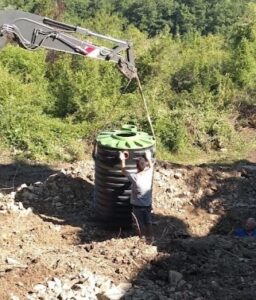
Previously: Our neighbour Giorgio has discovered that his septic tank is leaking and cannot be repaired.
It’s thirty-two degrees in the shade, and we’re sitting in Marco’s garden, waiting for the afternoon breeze, when Giorgio comes walking over.
To Annarita, the oldest inhabitant of our borgo, Marco and his wife, Diana, are still nuovi arrivati — newcomers. I sometimes wonder how she describes us. Marco and Diana have “only” been living in Casigno for twenty-five years. He’s from Naples, she was born in the Abruzze. Before buying this house, they lived in Bologna for ten years. To Annarita they’re still a bit gente di città—city folk. Maybe that’s why Giorgio has chosen Marco and me as his first confidants. He’s hoping for kindred spirits. He’s done his research — consulted a friendly geometra, a geologo, and even pulled some strings with someone he knows at Hera.
“Abbiamo un problema,” he says. We have a problem. Giorgio stops at the garden gate. Marco waves him in and heads inside to grab a bottle of Pignoletto and an extra glass, while I pull up a chair. Giorgio nervously eyes Nina, Marco’s German Shepherd, but ultimately decides to take the risk. Nina charges over and enthusiastically licks his hand.
I savour the cold bubbles as Marco tries to keep Nina from overwhelming Giorgio, who clears his throat and gets to the point. So, he’s asked around. Officially, Hera —the water company — should handle wastewater treatment, in collaboration with the local council. But Hera prioritizes areas with at least five thousand residents. Our municipality, Grizzana Morandi, barely has 3,900, and our little borgo? Maybe sixty people, if that.
So Giorgio consulted his geometra and — he pauses dramatically — non siamo a norma.
A norma, compliant. We do not meet legal wastewater regulations. Giorgio looks like he’s just thrown a live grenade under the table and is bracing for impact. Marco takes a sip. I eat two peanuts. We barely stop ourselves from shrugging — shrugging would be rude, and therefore very un-Italian.
Ever since we renovated our first house in Italy, I’ve known all about a norma — at least, as much as one can know.
“Officially,” any house not connected to the main sewer system has, for about a decade now, been required to separate its wastewater. There must be separate drainage for: acqua nera (toilet water), acqua grigia (shower and kitchen water), and acqua bianca (rainwater). These must then pass through various filters, grease traps, and Imhoff tanks before being discharged. (An Imhoff, by the way, is just a modern septic tank. Fancy name, same old concept.) If you’re discharging near open water, things get even more complicated.
Of all the houses in Grizzana Morandi, maybe one percent is a norma — and that’s an optimistic guess. Officially, the local council should be enforcing these rules but… well, you see where this is going. How exactly? Force every household to install a new system, at enormous cost? No elected mayor would risk his popularity on a decision like that. Plus, the council lacks both the manpower and the equipment to enforce it. And then there are the old borghi, like ours. In most cases, installing separate drainage systems is simply impossible — there’s no space. Which means it would need to be centrally managed. Which means, you’d think, a task for the council…
Luckily, Giorgio doesn’t voice the last part, or Marco and I would have struggled to keep straight faces. That would have been rude. And very un-Italian.
So it’s to be expected that we’re not a norma here. But still Giorgio does have a problem.
The moment you make any changes to your drainage — inside or outside — you’re required to submit a pratica, a permit application. And that pratica must comply with all a norma regulations, or it won’t be approved. To replace his leaking fossa biologica, Giorgio officially needs a pratica, which means he must install an entirely new system — not just outside, but inside his house as well. Understandably, he’s not thrilled.
He has come up with a plan though. He wants to gather all the borgo residents and make an appointment at the mayor’s office to demand a solution.
“Abbiamo un problema,” Giorgio repeats. We have a problem.
Any Dutch person would instinctively respond, “No, YOU have a problem.” But here in the garden, Marco simply refills our glasses. He smells an opportunity.
“See that bit of street and garden?” he asks, pointing to the front of his house. “See how it’s sinking, and the wall is leaning?”
Giorgio nods — it’s impossible to miss.
“That’s because there’s a drainage pipe running underneath it, probably serving five houses. And it’s on my land.”
Giorgio raises an eyebrow.
“If we’re going to talk to the sindaco about the fognatura,” Marco continues, “we definitely need to bring this up too.”
Giorgio, of course, has no choice but to agree.
To be continued.
A note on the Geometra Originally a land surveyor, the geometra has evolved into a jack-of-all-trades in the Italian real estate world. Buying, selling, renovating — if it involves property, a geometra is essential. He or she is the only one who hopefully can navigate the complex straits of local, regional and national regulations and laws. The good ones are worth their weight in gold. The bad ones … well, let’s just say they’ll make your life very, very difficult.
